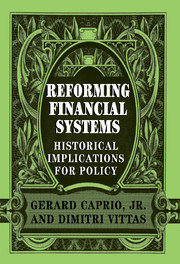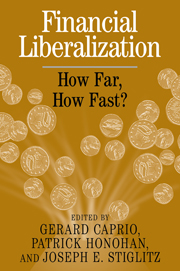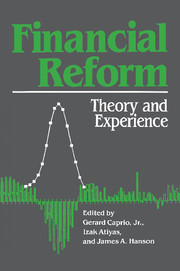Reforming Financial Systems
This volume summarizes the key lessons of financial history for emerging markets and developing economies today, including the rise and role of central banks, debates on how to make banking secure and sound, the relative efficiency of universal banking compared to the Anglo-American commercial banking model, and the role of savings banks, non-banks and securities markets in development. Two lessons that should be kept in mind in reforming financial systems are the importance of incentives and diversification. Robust financial systems require incentive systems that reward prudent risk-taking and encourage sound portfolio diversification. In addition, reputation has proved to be important: central bankers must demonstrate anew why they have earned a reputation for non-inflationary policies, and private intermediaries must similarly demonstrate again why they have earned a reputation for sound, as opposed to Ponzi, finance. Attempts to reform financial systems without due allowance for the time and effort to develop institutions, including reputation, are likely to prove short-lived.
- Puts contemporary questions of financial reform into historical context
- Treatment is highly accessible
- Contributors are well-known scholars like Gerard Caprio, Richard Sylla, Eugene White, Charles Calomiris, Forrest Capie and Michael Bordo
Reviews & endorsements
"This volume is sure to please financial historians no matter what their specialty. In addition, it should appeal to scholars of contemporary monetary regimes, especially those focusing on developing financial institutions....it should be required reading for all governemnt officials involved with the regulation of financial institutions." Michael Haupert, EH.NET BOOK REVIEW
"This volume is sure to please financial historians no matter what their specialty....it should appeal to scholars of contemporary monetary regimes, especially those focusing on developing financial institutions....it should be required reading for all government officials involved with the regulation of financial institutions." Michale Hupert, H-Net Reviews
Product details
June 1997Hardback
9780521581158
236 pages
237 × 160 × 20 mm
0.532kg
14 b/w illus. 20 tables
Available
Table of Contents
- List of contributors
- 1. Financial history: lessons of the past for reformers of the present Gerard Caprio Jr. and Dimitri Vittas
- 2. The evolution of central banking Forrest Capie
- 3. Free banking: the Scottish experience as a model for emerging economies Randall S. Kroszner
- 4. Regulation and bank stability: Canada and the United States, 1870–1980 Michael Bordo
- 5. Deposit insurance Eugene White
- 6. Contingent liability in banking: useful policy for developing countries? Anthony Saunders and Berry Wilson
- 7. Universal banking and the financing of industrial development Charles W. Calomiris
- 8. Before main banks: a selective historical overview of Japan's prewar financial system Frank Packer
- 9. Thrift deposit institutions in Europe and the United States Dimitri Vittas
- 10. The development of industrial pensions in the United States during the twentieth century Samuel H. Williamson
- 11. The rise of securities markets: what can government do? Richard Sylla
- Index.









